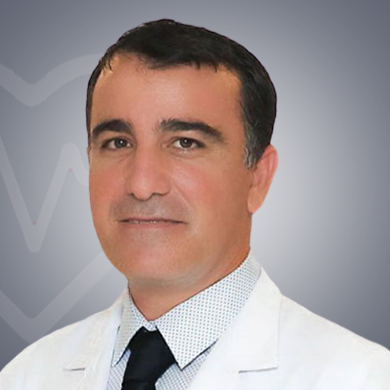
17 Years of experience
Speaks: English
Listed below are some of the conditions that surgical neurologist Ibrahim Aliosmanoglu treats:
Most women affected with breast cancer undergo some types of surgery as part of treatment. There are various types of breast surgery. This might be performed for different reasons. Surgery may be done to remove cancer through mastectomy. The surgery is also performed to know if cancer has spread to body parts and to restore the breast’s shape.
There are around 200 different types of cancer and all these can cause different symptoms. The symptoms are often linked to some cancer types. The signs could also be general, including weight loss, fatigue, and unexplained pain. Although there may be different symptoms in different types of cancer, some general symptoms of cancer include:
Dr Ibrahim Aliosmanoglu is available for consultation from 11 am to 6 pm (Monday to Saturday). The doctor’s clinic is closed on Sunday.
The list of popular procedures that Dr Ibrahim Aliosmanoglu performs for cancer treatment are given below
The surgeon assesses the condition of the patient before performing any procedure to understand the risk associated with the procedure. The neurologist is popular for their high success rate and patient-centric approach which helps fast recovery of the patient. With vast experience in performing even the most complex cases with high precision and accuracy, the doctor follows medical protocols. A surgical oncologist performs cancer surgery in two ways: minimally invasive surgery and open surgery. Minimally invasive surgery uses techniques that focus on minimizing the trauma of traditional surgery. Some of the minimally invasive techniques are cryosurgery, robotic surgery, laparoscopy, cryosurgery, and laser surgery. In open surgery, surgeons make a single large cut to remove the tumor and some healthy tissues.

Share Your Experience about Dr. Ibrahim Aliosmanoglu

Surgical oncologists are specialists who have received training in the diagnosis and treatment of cancer through surgery. A surgical oncologist performs procedures like biopsy and surgery to remove cancerous tissues. Surgical oncologists choose to perform surgeries to find out the locations where cancer has spread. While treating cancer, a surgical oncologist might remove cancerous tumors and surrounding healthy tissues, and nearby lymph nodes. The surgical procedures used will vary depending on the aim of the surgery. Surgical oncologists might do minimally invasive procedures or open surgeries.
Some of the most common test performed for the diagnosis of cancer are:
In most cases, surgical oncologists need to perform a biopsy in order to diagnose cancer. In this procedure, the doctor removes a part of the body tissues to examine under a microscope. The doctor then does other tests to check if the tissue is cancer.
If your primary doctor suspects cancer, he will refer you to a surgical oncologist for the diagnosis of the condition. The surgical oncologist evaluates the symptoms and analyses the test report to find out if you have cancer. An individual needs to consult a surgical oncologist in case of below situations: